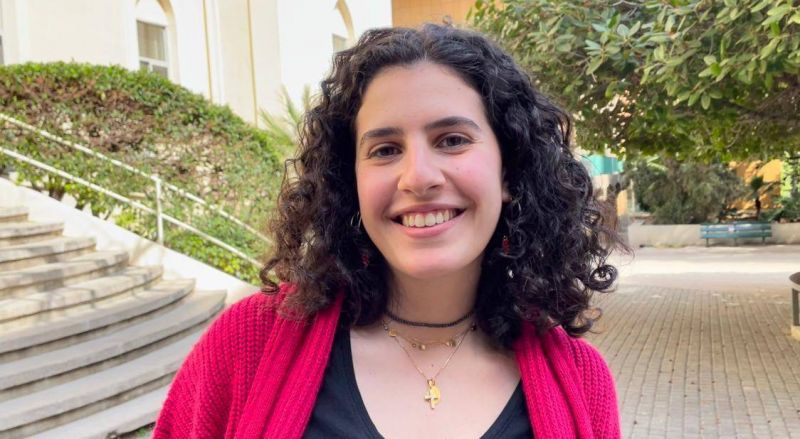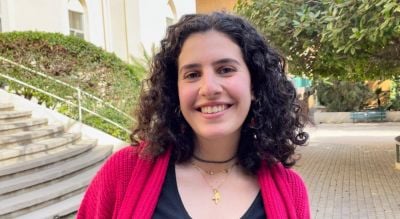
Ghyd al-Khouri, a first-year medical student at Saint-Georges University in Beirut. (Courtesy of Ghyd al-Khouri)
Maryam Maroun, a 19-year-old law student at the Holy Spirit University of Kaslik (USEK), admitted to using ChatGPT just once, when she was time-crunched to finish an essay.
“The platform enabled me to structure good plans and move my ideas along in a logical and efficient way,” she said.
ChatGPT is a powerful digital tool that can write essays, translate languages, tutor students, answer questions, assist with speaking and presentations, summarize articles, clarify topics and offer personalized learning.
While Maroun did not deny the advantages of artificial intelligence (AI) — such as saving time and information accessibility —she admitted concern about a lack of honesty in her work.
Despite her limited experience with ChatGPT, she felt she was “cheating” by using AI, and “not being true to her passion for writing.”
Maroun said she fears that “the platform not only affects the people’s ability to create and express themselves but also influences their willingness to do so.”
AI lacks “essence, feeling and character,” Maroun added.
 Maryam Maroun, a 19-year-old law student at the Holy Spirit University of Kaslik (USEK). (Credit: Margot Abdallah)
Maryam Maroun, a 19-year-old law student at the Holy Spirit University of Kaslik (USEK). (Credit: Margot Abdallah)
Naji Chebli, a 5th-year computer and communications engineering student at Notre-Dame University (NDU), said he used ChatGPT “to get a quick overview” on a specific topic.
“ChatGPT provides an almost immediate answer to most questions, and even offers coding examples and samples,” he said.
Chebli acknowledged that AI could be used to cheat during hiring processes, but he believes applicants will be disqualified once the recruiter discovers that the applicants have not mastered basic skills.
ChatGPT can be used to instantly generate emails and essays. But Chebli pointed to the potential risks associated with its use, explaining that AI handles huge amounts of data, which poses a high risk of security and privacy breaches.
Toufic Lattouf, a computer and communications engineering student at the American University of Beirut, said ChatGPT simplifies his coding work.
“I know how to code, but I use ChatGPT as a source of inspiration to simplify the work,” he said.
For Lattouf, ChatGPT doesn’t raise any ethical concerns, but he said that it can make people “lazy” and reduce the quality of their work performance.
“The robot isn't perfect; the user needs to have a basic knowledge to be able to spot mistakes made by the robot,” said Lattouf. The 22-year-old believes the platform does not have the capacity to replace jobs, but could instead facilitate employees’ tasks.
For Andrea Abdelnour, a 20-year-old audiovisual student at the Lebanese Academy of Fine Arts (ALBA), using ChatGPT is “a last resource.”
She said she fears losing her creativity and identity as an artist by using AI.
But, “ChatGPT and AI, in general, are tools that help artists achieve their goals more efficiently and quickly,” Abdelnour added.
The young photographer, who used the chatbot in a screenwriting course, is anxious about the idea that AI could one day replace artists.
For her, ChatGPT should be seen as “a tool, not a medium.” She stressed the importance of using the platform wisely and with good intentions.
“AI intervention must not alter the artist’s personal touch,” she said.“AI pushes my inspiration and creativity ever further because it contains all kinds of visual, sound and audiovisual responses.”
 Toufic Lattouf, a computer and communications engineering student at the American University of Beirut. (Credit: Thalia Lattouf)
Toufic Lattouf, a computer and communications engineering student at the American University of Beirut. (Credit: Thalia Lattouf)
Carl Azzi, a 21-year-old mechanical engineering student at AUB, said he sometimes questions his integrity when using ChatGPT.
“I sometimes wonder if I’ve crossed the line by using this platform,” he admitted.
However, he said he tries to take advantage of the platform’s features without cheating.
“I’m aware of the platform’s ability to generate solutions or reports that I am supposed to produce myself,” he said.“I wouldn’t say this invention is unethical, but its use can be.”
Ghyd al-Khouri, a first-year medical student at Saint-Georges University in Beirut, said ChatGPT is unable to answer questions in medicine, as such questions are based on case studies and multiple-choice questions.
The 21-year-old stressed that she uses ChatGPT “to gather information or to transform PowerPoint presentations and lectures into simple, organized and clear ideas.”
For her, the chatbot is a tool that makes it easier to take notes and enrich her personal knowledge.
In the field of medicine, ChatGPT cannot provide the perfect medical intervention or prescribe the right medication. It's a doctor’s role to provide the best treatment by examining each case and taking several factors into account to ensure that the patient gets good results, which is something AI is incapable of doing.
Among professors
Professors’ opinions on ChatGPT are divided, said Halim al-Khazen, a lecturer at the Faculty of Economics at Saint-Joseph University (USJ).
Some want to ban the software because they see it as a way for students to cheat, while others see it as a tool for expanded learning.
“I see great potential in ChatGPT,” said Khazen. “I’ve already started using it to support my university, but for now, its use remains a matter of debate and is not yet integrated as a technical or functional support in our institution.”
He said USJ is actively studying the risks and issues involved in the platform.
With ChatGPT, students can work directly with a digital tutor to explain complex concepts and realize their full potential, said Khazen. He admitted, however, that it is extremely difficult to detect cases of AI plagiarism.
“Give ChatGPT a chance, I’m sure you’ll be fascinated by what you discover,” he said.
This article was originally published in French in L'Orient-Le Jour. Translation by Joelle El Khoury.
